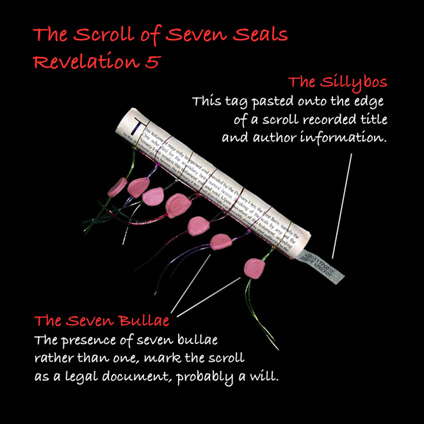
The scroll of Rev 5 is a deed of redemption, and as such becomes effectively a will of inheritance. It is the legal document proving that a qualified Kinsman has paid the price to redeem the land once forfeited by His family. As each seal is broken, the deed of redemption reveals what must occur for the Kinsman-Redeemer to physically repossess the land, wresting it from enemy squatters, and returning it to those who were originally given dominion over it.
Saturday, February 26, 2005
The Scroll of Seven Seals
Thursday, February 17, 2005
Hot, Cold or Lukewarm?
Laodicea lacked its own water supply in the summer, and so, accompanied by the daily grumbling of the residents, their imported water arrived in a tepid and impure state by a long viaduct. The reproof of lukewarmness would have pierced the Laodicean Christians — lukewarm to them meant disgusting.
In first-century Asia Minor, cold water benefited those who drank it as did hot water, but lukewarm water, particularly the tepid and polluted water of Laodicea, nauseated those who drank it. In like manner, the Laodicean church was sickening both their community and the Lord. The Lord’s reproof in this passage reveals what history confirms: the Laodicean mindset was one of self-sufficiency. They were like the Deists who would come much later but in the same spirit, teaching that “God helps them who help themselves.” By its attitude and lifestyle, the Laodicean church was communicating the very opposite of the gospel, namely that a person did not really need Christ but only needed to apply himself with drive and ambition. The Lord’s desire for the Laodicean church was that it would demonstrate a life of dependency and faith that benefited rather than spiritually poisoned its community.
Which brings us to an interesting question about the Lord’s threat to vomit the Laodicean congregation “out of my mouth”: why is the church (metaphorically) in the Lord’s mouth? Because it is the vehicle of His word in the community. Just like the Corinthians, the Laodiceans were “a letter from Christ” … “known and read by everybody” (2Co 3.2,3). The letter must be faithful to its author, or it must be disavowed.
For a fuller discussion of Rev 3.15,16, please see the Timothy Ministries commentary on the Book of Revelation.
In first-century Asia Minor, cold water benefited those who drank it as did hot water, but lukewarm water, particularly the tepid and polluted water of Laodicea, nauseated those who drank it. In like manner, the Laodicean church was sickening both their community and the Lord. The Lord’s reproof in this passage reveals what history confirms: the Laodicean mindset was one of self-sufficiency. They were like the Deists who would come much later but in the same spirit, teaching that “God helps them who help themselves.” By its attitude and lifestyle, the Laodicean church was communicating the very opposite of the gospel, namely that a person did not really need Christ but only needed to apply himself with drive and ambition. The Lord’s desire for the Laodicean church was that it would demonstrate a life of dependency and faith that benefited rather than spiritually poisoned its community.
Which brings us to an interesting question about the Lord’s threat to vomit the Laodicean congregation “out of my mouth”: why is the church (metaphorically) in the Lord’s mouth? Because it is the vehicle of His word in the community. Just like the Corinthians, the Laodiceans were “a letter from Christ” … “known and read by everybody” (2Co 3.2,3). The letter must be faithful to its author, or it must be disavowed.
For a fuller discussion of Rev 3.15,16, please see the Timothy Ministries commentary on the Book of Revelation.
Subscribe to:
Posts (Atom)

